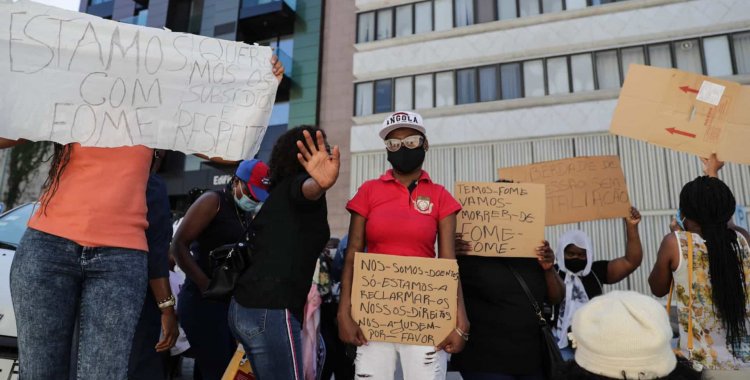"If I go to Angola and if my catheter has any problems, they have no way of reversing the case. Here, anything that happens they know how to do and Angola does not know what to do," Amélia Domingos, one of the Angolans that this Friday manifested themselves in front of one of the two pensions in Lisbon where some of these patients live.
These approximately 200 patients received support from the State for their stay while undergoing treatments in Portugal, but on January 30 the Executive announced the closure of the health board in Portugal, starting in February, after an audit that will have identified several abuses in the use this mechanism.
Without receiving the subsidy since September last year, and no longer entitled to stay overnight in pensions - which for the time being still host them - about a dozen patients protested the return and even claim that it will mean their death.
"What do they want? To sign the death sentence for all the patients? This is inhumane", lamented Amélia Domingos, who has had kidney failure for 17 years and 12 in Portugal.
When she arrived, the doctors didn't even believe her condition, after years of undergoing hemodialysis. Now, after infections that forced her to stop peritoneal dialysis, Amélia has a catheter in her vena cava and is waiting for a transplant.
"If one day I have a transplant and everything is taken care of, I want to go back, because I miss my people," she said, adding that now she doesn't want to go back, as she knows that she will find "certain death" there.
Vitorino Leonardo, secretary-general of the Association for the Support of Angolan Patients in Portugal (ADAP), where he has lived for 12 years and has had a transplanted kidney for four years, guarantees that these patients will do everything to continue receiving treatments at Portuguese health services.
He guarantees that there are no conditions for return and says that two patients who chose to return are now "being abandoned" and that the doctors who follow them question them about the reason for their return.
"If the patients return to Angola, they are going to die," he said, thanking Portugal for the "exempt, plausible behavior" that it has shown towards these Angolans.
According to Vitorino Leonardo, the patients who need more care are cancer patients, transplant patients and hemodialysis patients.
In his case, when he spoke to the doctor about a possible return, he would have told him that without treatment he would die and a kidney that could have gone to a Portuguese person would be lost, he said.
The ADAP secretary-general asks Portugal for help, as "people are going to leave their pensions and they cannot go out into the street". "We need Portugal to help us. Since our Government is discarding us, we will have to resort to the European Union, to see if they welcome the staff to stay alive," he said.
Domingos Fragoso cannot contain his tears when he addresses an eventual return to Angola. This Angolan suffers from a chronic kidney disease and has been in Portugal for four years, now waiting for a kidney transplant. "I'm on a pre-transplant appointment and I'm already on the transplant list," he said.
It was "sad and with a lot of pain in his soul" that he was ordered to return to a country with "poor health conditions". "In Angola there are many difficulties and the country doesn't even have transplants. I want to have a better quality of life and go back to work," he said.
ADAP had already sent a letter to President João Lourenço, calling attention to the particular situation of some patients who need follow-up that they do not find in Angola.
The association asked João Lourenço "for a moratorium or review of the decision taken, in order to avoid unpleasant situations and unpredictable consequences" and to proceed to "analysis and assessment of case by case, depending on the pathology of patients who are in conditions to return to the country, with guarantees of continued medical and medication assistance ".







